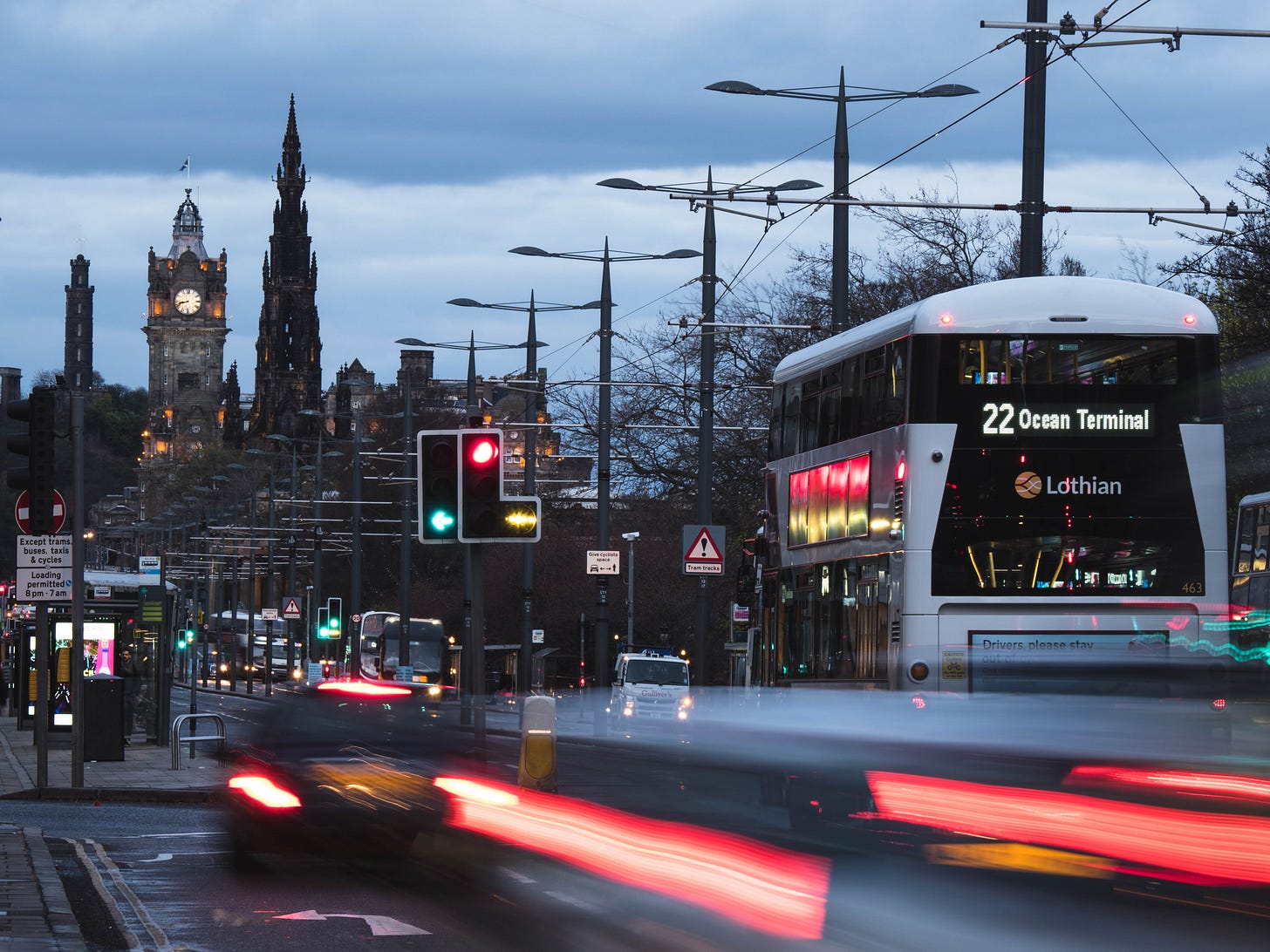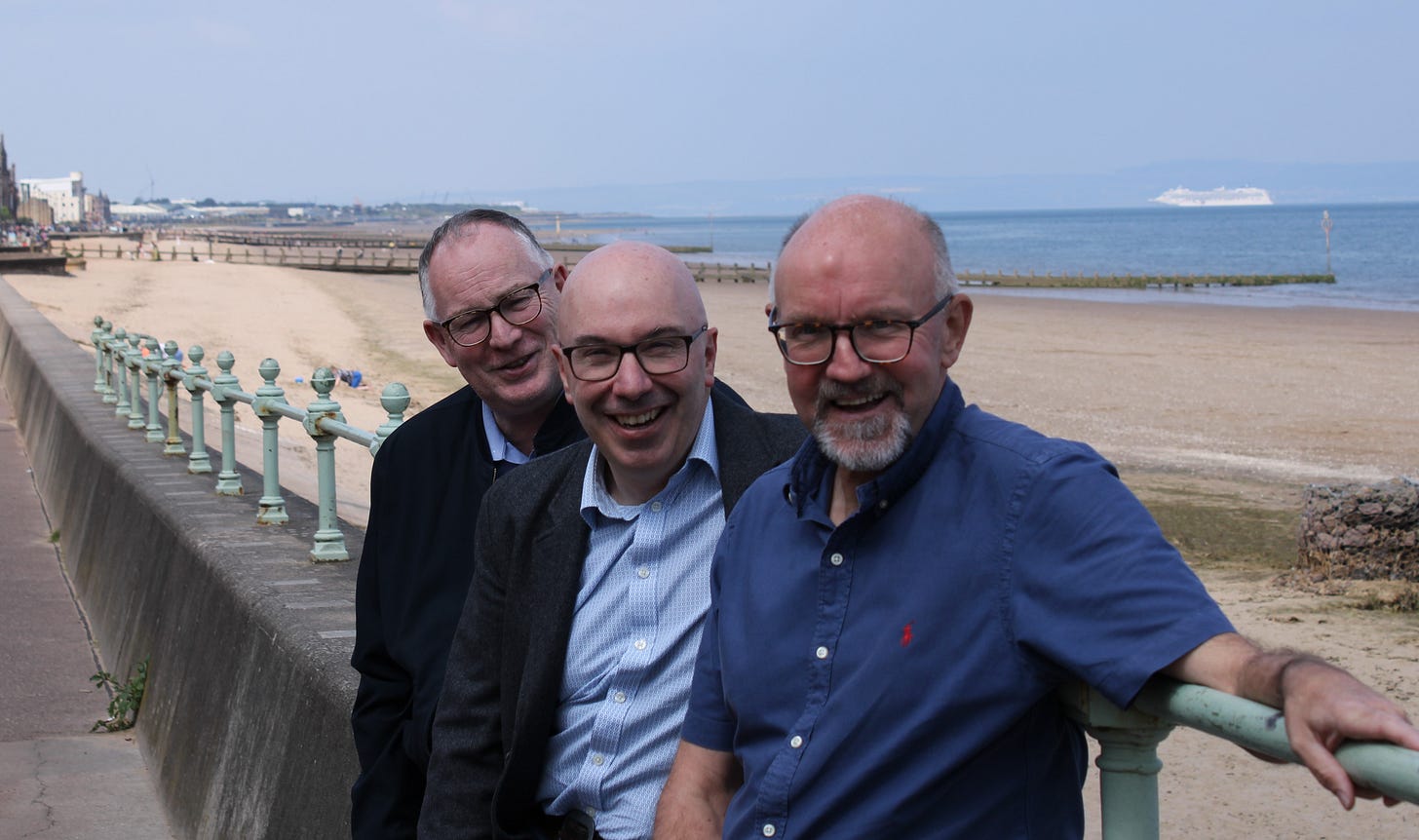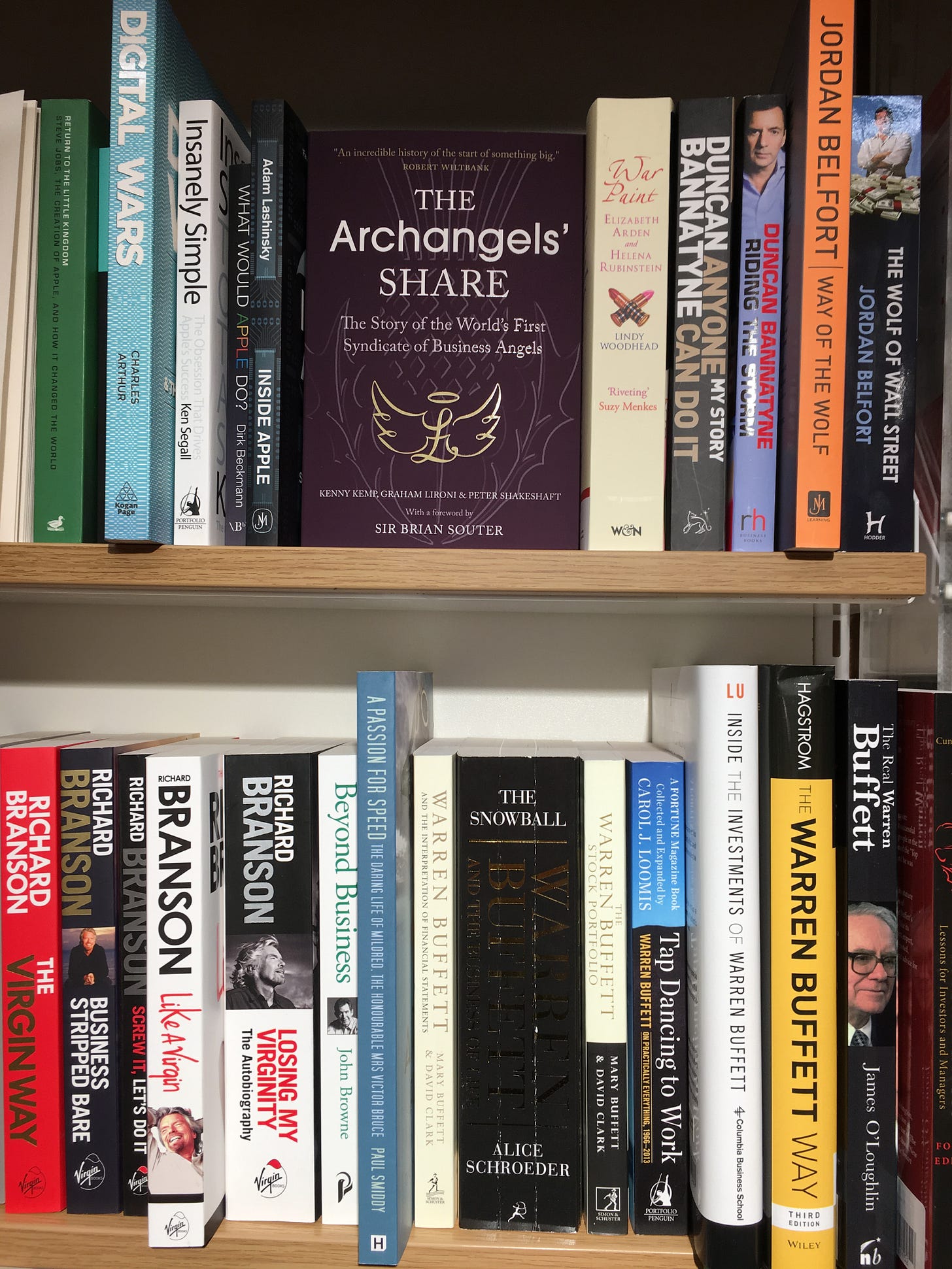Why Edinburgh needs a new digital newspaper
Meet the the Inquirer team and learn about our plans to transform journalism in Scotland's Capital
Welcome to this special preview edition of the Inquirer - and thank you for supporting the revival of high-quality journalism for and about Edinburgh.
We start publishing our weekly round-up newsletters every Monday from next week, packed with all the latest developments in city politics, business and life across Edinburgh and the Lothians. Sign up now to receive these email newsletters and our regular features. Don’t forget only our paid members will get all our in-depth reporting, receiving at least eight members-only editions each month.
We have a lot lined up for you including insights from some of the city’s leading business figures, a revealing, exclusive interview with city council leader Cammy Day and an in-depth look into the Capital’s music and cultural scene.
First of all, we wanted to introduce ourselves today as the founders of the Inquirer and tell you about our plans and what we think we can bring to the city.
Below, Euan McGrory explains why he is passionate about long-form journalism as a force for good and how he believes we can all help reverse the decline which has seen as many as a third of UK journalists lose their jobs. Also from their personal viewpoints, Kenny Kemp talks up the role of our wealth-creators and the need to build enterprising and innovative firms across the city, while David Forsyth looks at the importance of education, our universities and colleges and the vital skills a progressive city requires for the future.
Why Edinburgh needs a new digital newspaper
by Euan McGrory
I remember so clearly the first day that I set foot in the newsroom of The Scotsman, deep in the bowels of its imposing old North Bridge headquarters, in 1999.
The first thing that struck me was the banks of desks, row after row of general and specialist reporters, with separate ones for the business desk, features department and even - most impressive of all to me - a dedicated investigations team tucked away in a side room.
I was a young reporter who was making a bit of a name for myself on a famous old title in the north-east of England, The Northern Echo, ambitious to take the next step up in the intoxicating world of journalism - and anxious that I wouldn’t be good enough.
The first challenge for me was working out which of the many editors on the large, central news desk I should be reporting to. The next, quite unexpectedly, was getting them interested in any of my stories.
Having come from a paper where I spent my days filing copy to fill the next day’s paper, here were news editors who didn’t even want to read my stories unless I could convince them first that it was important or entertaining enough.
I did my best to do that. I did pretty well in fact. One day one of my stories, about concerns over the impact of education funding cuts, made the outside column of the front page. On another day, another, about a Morningside resident who had been ordered to tear down his kids’ tree house because it didn’t have planning permission, was used to fill almost the entire page three.
Despite my best efforts, I didn’t quite do enough to land a precious staff job, as opposed to earning more casual shifts. It would be 20 years later that I took the editor’s chair, helping to steer the newspaper through one of the most turbulent times in recent history, as the country navigated the Covid pandemic and lockdowns.
The great thought and care that went into the stories that we wrote then stuck with me throughout my career, which has included two spells as editor of the Edinburgh Evening News and one in charge of Scotland on Sunday. I was also inspired by the commitment to journalism that entertained whenever it could, but above all was intelligent, well-researched and shone light on subjects that were important to its readers.
Shining a light
I am proud of what I and many colleagues have achieved over the more than 25 years that I have been working as a journalist. Our reporting, dogged at times, has done much to improve life in Edinburgh and the Lothians as well as the north-east of England where I worked before joining the Evening News.
Care of the elderly in the city’s hospitals has been improved after the health board ordered an inquiry into failures exposed by our reporting. The powerful testimony of many patients and their families, including former Lord Provost Norman Irons, was impossible to ignore.
The NHS changed its rules after we told the story of hundreds of its patients who were buried in unmarked graves after dying on mental health wards without the means to pay for any kind of memorial.
We also played our part in rallying community support to keep the doors open when Gorgie City Farm and the charity Dad’s Rock, who do brilliant work supporting fathers in the city, were threatened with closure.
I could go on, but you get the idea. There are many more stories from over the years of how the newspapers that I worked on helped change local life for the better, in ways big and small. It was always the result of giving readers a voice to raise their concerns.
We made readers laugh, and cry, along the way, but we did important work too.
Sadly, that kind of journalism can seem increasingly like a thing of the past.
Times are undoubtedly tough for most of the traditional news media. The number of journalists working in the UK is estimated to have fallen by a third in recent years.
The pattern of declining print circulations and the struggle to find ways to make journalism pay online will be familiar to most of you. For every digital success story like the global Guardian and New York Times, there are dozens of historic titles - many serving local communities - that have fallen by the wayside.
The result all too often is local newsrooms with a dwindling number of staff struggling to cover the basics. There are many fantastic journalists doing amazing work, but the odds are increasingly stacked against them.
And, if I had a pound for every person who has complained about those annoying pop-up ads, I would be a rich man today.
What can be done?
I passionately believe that there is a bright future for a reinvigorated form of city journalism. One that looks and feels like the kind of thoughtful and considered writing that inspired me and my former colleagues.
What is more, I think that it is entirely within our grasp. You don’t have to take my word for it. Speak to the people of Manchester, Bristol, Dublin, Liverpool or Sheffield where new media start-ups are thriving. All those cities now support small, independent digital publishers producing lots of well-researched and indepth journalism about their communities.
Take a look at the kind of thing that one of them The Manchester Mill has been doing.
Edinburgh is a great international city, with a rich history of innovation, journalism and enlightened public debate - it deserves the same.
Two things unite these local journalism success stories. Firstly, they focus exclusively on issues affecting their communities, going into real depth, talking to experts and those directly affected, and bringing useful insight to often contentious subjects.
Secondly, they are all funded by paying members. That means they live or die based on the number of readers who value what they are doing enough to pay in order to read and support their journalism. In our case, the cost is £8 a month, less than the cost of a cup of coffee a week, and less for annual and group subscriptions.
It also means no annoying pop-up ads. And no incentive to write sensational or ‘clickbait’ headlines in an effort to drive a mass audiences and earn more money from advertising.
It is an exciting model which puts high-quality local journalism at its heart. It is the model that we intend to follow, but we cannot do it without your support.
Endeavour and enterprise have been bedrock of Capital’s sustainable success
by Kenny Kemp
Our city is an astonishingly entrepreneurial and inventive place – yet somehow this facet of Edinburgh’s success gets completely lost amid all the other urban noise. Let me give an example: in January this year an Edinburgh start-up, expert in AI, was sold to a European pharmaceutical company for over $100 million. A very nice deal indeed. Yet this business news hardly made a ripple in the Scottish mainstream media.
Such a deal is the tip of the iceberg of the exciting companies in Scotland, many still battling hard to recover after the COVID-19 pandemic.
Over the past 25 years, I have written about and interviewed several hundred of Scotland’s entrepreneurs to identify the contributions they make to our nation’s wealth. Their stories are varied, compelling and often astonishing. Back in 1999, I was the founding Business Editor of the Sunday Herald, and our team was keen to shed light on this emerging cohort of entrepreneurs in Scotland. Many had never spoken with the media before and it was their first tentative steps in print. Several have gone on to become multi-billion pound businesses.
While the then Glasgow Herald and The Scotsman concentrated their coverage of our PLC base, then numbering some 60 or so listed plc, with around 10 in the FTSE100, it was exhilarating to do something different and learn about the emerging entrepreneurial class. At the Sunday paper, we set out to raise the profile in a positive way. We were also the first to champion women in business with our annual 100 leading women in business series, which evolved to become the Scottish Women in Business organisation.
Yet, the emerging generation of founders and financiers are lurking in the media darkness again. Yes, they might get some online coverage in the trade press, but they are seldom written about in the wider news pages. In truth, there are scores of interesting companies in Edinburgh, yet they don’t get much airtime or coverage.
Edinburgh Inquirer is about to change this. We will be looking more closely at our enterprising ecosystem, and engaging with the advisers who help with the contracts, the funding and vital capital, or with HR or coaching pros who develop the talent. We will be speaking with the top law firms and the accountancy practitioners to hear how they are doing the deals - and what can be passed on in the public domain to enhance the knowledge.
Of course, Edinburgh has been transformed since 2000. But has the first 25 years of the 21st century been good for business and commerce in the city? We’ve seen a shift away from our banking and financial strength to more tech-based companies, there are more coffee-shop entrepreneurs, more hotels, a plethora of tattoo parlours and bike shops. But is this all sustainable?
While the new St James Quarter is a masterpiece, our main thoroughfare, Princes Street, is a shadow of its former glory. So how well is this wonderfully enterprising city actually doing? We’ll be using the best data we can find to feel the pulse of the Capital’s companies.
And we’ll be questioning our local policymakers to see if they are making the best decision about business and enterprise in the City. Are they using the money from business rates wisely? And how do we keep Edinburgh as a brilliant place to visit, eat, drink and shop, without damaging the very fabric and flow of the city we love so much.
Above all, how does Edinburgh become an exceptional place to build the next Unicorns?
There have been plenty of ‘let’s-be-more-entrepreneurial’ initiatives set up by our politicians in the past 20 years, and they are constantly trying to re-invent the wheel, but do these schemes work? We’ll be delving into this.
We’ll be getting out and about in our city – not sitting in our offices at home. We will be kicking the tyres of business in our Capital. We hope you will be part of this, we look forward to hearing from you – and helping us at Edinburgh Inquirer with this new venture.
Learning is the key to our future
by David Forsyth
I love Edinburgh. I really, really do. I love the beauty of the city. I love the resilience and innovation of the city. I love the increasingly cosmopolitan, international nature of the city. I love our infatuation with culture and the arts. I love our football teams (well, one of them.) I love our restaurants (sadly a little too much.) I love our friendly-but-not-in-your-face people.
I love our history - and the mark our people have made on world history over the years. I love that our city regularly wins awards for everything from Foreign Direct Investment to Quality of Life. Let’s face it, Edinburgh is a bloody marvellous place to live, work in, or visit.
Clearly an increasing number of people are learning to share my view, because in the past ten years our city has grown by more than 10% to a population recorded in 2021 as 526,470. And that takes me nicely onto the final reason I love Edinburgh that I’d like to highlight. I love our magnificent obsession with education…
So, here’s a stat to ponder. At any point in time, Edinburgh has more than 160,000 people studying at its more than 350 seats of learning – from nursery to university and everything in between. Look again at the size of the city and look at the numbers we are educating. Little surprise then, that one of the key drivers of Edinburgh’s success has been her people, with more than half of our workforce educated to degree level. By the way, that doesn’t include me.
I was, however, educated in the city, at the Royal High School back in the days when it was transitioning from grammar school to a state comprehensive. Like the city it represents, it goes back a long way with roots stretching all the way back to the Abbey of Holyrood around 1000 years ago.
My father taught there for many years, as Principal teacher of English, and I remember him bringing a cardboard box full of stuff home one day. He had been leading a project to renovate the school’s neglected but extensive archives in the old building on Regent Road, and in his work had uncovered some wonderful finds. A poem written by Sir Walter Scott when he was a pupil; a class photograph of Alexander Graham Bell; a piece of the deck of HMS Victory from where Nelson fell – a school FP had been an officer on the ship at Trafalgar. It was mesmerising stuff.
In one humble box lay so much of what I have now grown to love about Edinburgh. History, culture, scientific progress and innovation. The importance of education clothed in cardboard.
All things change, and change is one thing that is as inevitable as death and taxes, but in Edinburgh we continue to be obsessed with education.
As our city grows further, with the benefits and challenges that brings, the Edinburgh Inquirer will faithfully, fairly and constructively write on the important intersection of politics, business and education. We will contribute to the vital debate on how our education system must be supported to contribute to a brighter, fairer and more sustainable future for our city and our nation.
Just look at our schools. In the state sector we have 90 primary schools, 23 secondary schools, and 11 special schools. We have 207 Early Years centres. And we have 18 independent schools operating in the private sector.
We have four universities and one college.
We have around 25% of pupils studying in Edinburgh attending independent, fee-paying schools. We also have an estimated 22% of all children in our city living in relative poverty. Debate around the educational attainment gap will – quite properly – rage on.
In that education debate we need to focus. We need to focus on raising standards, rather than simply on equalising them. We need to focus on what works in an increasingly diverse population. We need to focus on the kind of skills our people will need in future – but without losing the primary purpose of education. The word itself is rooted in Latin and means “to lead out or bring forth.”
My dear old Dad used to insist that the best education helped young people learn how to think for themselves. It was about bringing out their potential, not banging in information.
For centuries, Edinburgh has led through education. It is important for all of us – for our politics, our business, our arts and culture, our sport, our health and wellbeing, our resilience. For tackling poverty, for creating inclusion and fairness. For a better future.
It is so important, and those of us who love Edinburgh know it.








We're up and running!
So delighted to see the Edinburgh Inquirer launched, I have no doubt it will be a huge success and is a much needed addition to the media. I've long been saying that Scottish SMEs and entrepreneurs deserve to have their stories heard and challenges aired. In addition to the other content you will be publishing, I'm very much looking forward to reading well-informed, relevant and thought-provoking articles. The very best of luck to you all - not that you'll need it!